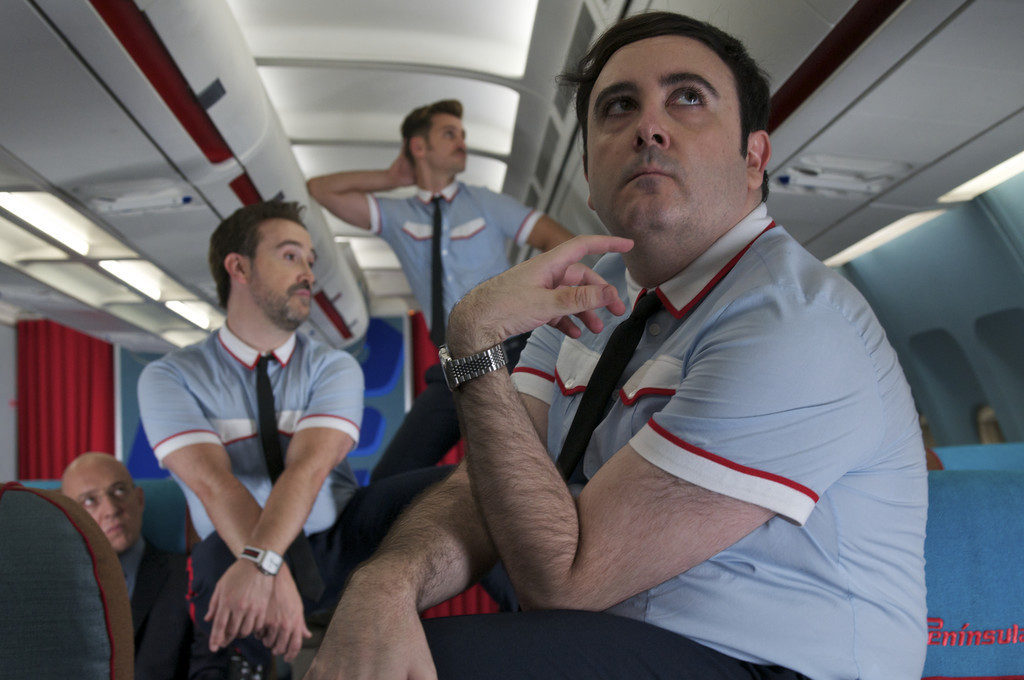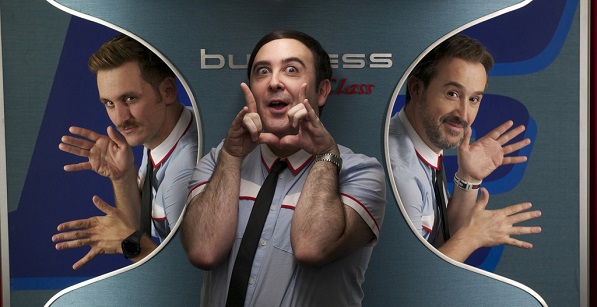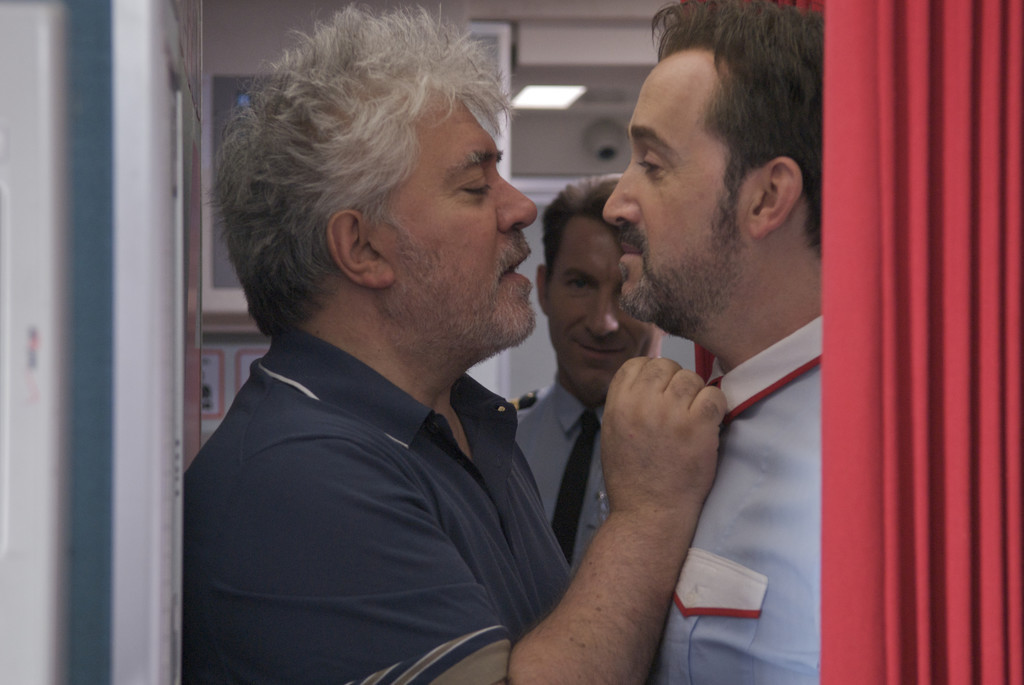With his newest film, I’m So Excited, director Pedro Almodóvar returns to the outrageous and satiric comedies of his early filmmaking days as part of La Movida Madrileña, the counterculture movement that flourished after Franco’s death in Spain. The film satirizes the politics of the class divide in Spain, and the ways in which people compromise their true selves to stay at the top, but when faced with death, their authentic selves break free.
In the film, an airplane bound from Madrid to Mexico is circling the Spanish city of Toledo due to a technical failure that may end in a deadly crash. The plane’s crew strives valiantly to make the passengers comfortable through acts of kindness, lip-synching a musical number and the surreptitious administration of drugs. The passengers and crew, driven by the prospect of imminent death, express and resolve their inner demons with public confessions and riotous sex.
I sat down to discuss with film with three of the stars: Javier Cámara plays the head airline steward Joserra, Miguel Ángel Silvestre plays a passenger on his honeymoon, and Blanca Suárez plays the earthbound ex-girlfriend of a womanizing passenger.
Keyframe: Blanca and Miguel, this film seemed to present unique challenges from an acting standpoint in reacting to your respective partners. Blanca’s runaway boyfriend communicates solely by phone from the airplane, and the character of Miguel’s partner is unconscious through most of the film. How were you able to convey these relationships? How did each of you build your character, what did you draw on?
Blanca Suarez: I think my character has a lot to do with the kind of romantic breakups that all of us experience at one time or another. After this breakup, she keeps going ahead with her life. But she isn’t fully aware that she hasn’t really overcome the emotions that she has just been through. Like most of the characters in this film, they are having a catharsis. She is becoming aware of [who] she is and what she wants.
I had the good fortune, when we started shooting [that] Guillermo Toledo, who plays the boyfriend that’s on the plane, was present, so it really wasn’t that much of a separation as you might think. When she does come to the realization of what is happening to her emotionally, she doesn’t have any other characters around to confirm it. She has to do it all on her own.
Keyframe: Miguel, how do you feel about your part? It’s a bride and groom, and the bride is unconscious the whole time.
Javier Cámara: It’s Prince Charming. That’s the first time I realized it.
Miguel Ángel Silvestre: In a way, I don’t want her to suffer in the situation with the plane. What Pedro wanted me to do with this character is to be a street-smart guy, a drug dealer, but with this childlike innocence. That innocence makes you connect more with him. It was nice when I decided to share all the drugs with all the passengers, because I realized that might be the last day of our lives. It’s the way they release themselves, when they take these drugs and they can connect themselves.
At the beginning, you can see that these characters don’t have any connection. They are totally different. They come from different worlds. But, when they face death, they’ve become more personable. You can see the child that they have inside and that they connect to themselves through sex. It’s nice to see that. There are main characters that you can judge from the very beginning, like a dominatrix or a corrupt politician or a drug dealer. But, at the end, you can see that they have their own soul. You can see their vulnerability. That’s one of the things that I like about Pedro’s film.
Keyframe: I think that carries through all of his films. Javier, in [a previous Almodóvar film] Talk to Her, you have a character doing something that is a real transgression. But you give the audience a strong feeling for his humanity and his soul.
Cámara: I was really worried when we were rehearsing this film because I talked with Pedro. I said, ‘Pedro, OK, we have ninety sequences or scenes. We have ninety sequences without telling the truth to the audience. I think that as soon as we say the truth, they’re going to kill us.’ He told me, ‘OK don’t be worried, because if you’re doing your work correctly, everybody’s going to love you and everybody is going to forget those mistakes.’ I said, ‘It’s not only a mistake, Pedro. It’s a very impolite way of life.’ He told me, ‘Don’t worry. I trust that, if we are prepared, we will do a very beautiful film. I don’t think anybody’s going to judge this character.’ I love when Pedro doesn’t adjust his characters, and he is liberated from the prejudice in his films. He works in breaking genders. No matter who is having sex with someone and breaking the rules between tragedy and comedy, he has mixed in everything. He is a melting pot constantly with his films. You have to trust him to work with him.
Keyframe: I think too that this film is very much a melting pot. It’s a satire. There is love. There is a cabaret sequence in the middle of the film.
Cámara: Yes, it’s crazy.
Keyframe: With that, it’s such a mundane environment that you are doing it in. You are lip synching to the Pointer Sisters in an airplane cabin, but it feels like a real performance and something much bigger. How did you sell that to the audience? It becomes almost like a Busby Berkeley sequence in the middle of this disaster film.
Cámara: Well, this sequence, it was a surprise for us. It wasn’t in the first script. Pedro improvised the sequence with Carlos, Raoul and me. He wanted to stop the film. Again, we were worried. ‘Pedro, comedy is rhythm. Are you going to stop the film?’ He said, ‘Yes. I’m going to stop the film.’ ‘How many minutes are you going to do that?’ He said, ‘The whole song.’ ‘OK. OK.’ He surprises you constantly, as an actor, with his imagination, to the audience constantly. Of course, Pedro wants to succeed with everybody and to be understood in every single country. But he is following his feelings every single day. He’s like, ‘Oh, my God, I don’t know if the picture here is good. I don’t know if this movement is good. I don’t know if this color is good. I don’t know if this drawing is good.’ It is always under question. He is questioning everything.

That is the work of an artist. He is questioning the world, not only his own world, but the rest of the world. I love that. It’s exhausting to work with somebody like him, because you have to have 100 percent of your energy every single moment. But it’s fantastic. I spent five years at a University in two months with Almodóvar. For me, it was a great, great gift to work with him. He’s a very talented guy. Of course, he suffers a lot, because this kind of talented guy suffered a lot. But he was displaying the characters’ fears and their world. Sometimes he succeeded.
Keyframe: I think there is a love of humanity. That’s why I was particularly drawn to your character. The reason why they did the cabaret was to comfort the passengers. Your character has a lover who is married. He pretty much tells him, ‘You’ve got to call your wife and children.’ It’s great, because normally anyone would see that as an adversarial relationship, between a lover and a wife.
Cámara: I didn’t completely understand that character. I demanded an explanation. ‘May we change that, because it’s so difficult to maintain that relationship, with a boyfriend, who doesn’t want to only be sexual with you and that you are trying to help his family? You’re trying to melt down everything and calm down and have everything in order and not worry?’ He doesn’t want to talk to him, because he has ordered all of his life. It’s like, ‘Pedro, I understand that it is funny and comedic.’ Pedro told me, ‘That exists. That exists. I know people like this.’ OK, I know. But it is difficult to believe. He told me, ‘Everything is difficult to believe. But, I’m not doing films with simple characters. I’m doing films with warring characters, fighting against the world or fighting against some prejudice or feelings or behaviors.’ That’s what an actor loves, of course.
Keyframe: It seems like that would be more of a challenge.
Cámara: Everything is a challenge. Comedy is really hard to do. It’s a tragedy.
Keyframe: Also it’s a challenge because you’re not just doing comedy. You also have to really sell the emotional aspects of it, while having a disaster film and while having a political satire on top of that. The film depicts a captive management class in the business cabin and the working class is literally sedated in the rest of the plane. It seems to reflect the current economics and politics that are in Spain. What was it like to address that, to have that political aspect to the film?
Silvestre: We never knew that he was doing that, when he was shooting. When I read the script, I didn’t see all the metaphors that he was using. When I first saw the film, I was very shocked. Because I could see the reality in Spain, the many metaphors, the many characters, and the tough situation that was living in Spain. Pedro put many metaphors there. You can see at first comedy, our crazy comedy, to release yourself and have fun, to go wild to the theaters. We have something for somebody who needs to celebrate or have fun. But, at the same time, you can see that there are many, many layers in the film. You can see all what you have mentioned, the reality.








